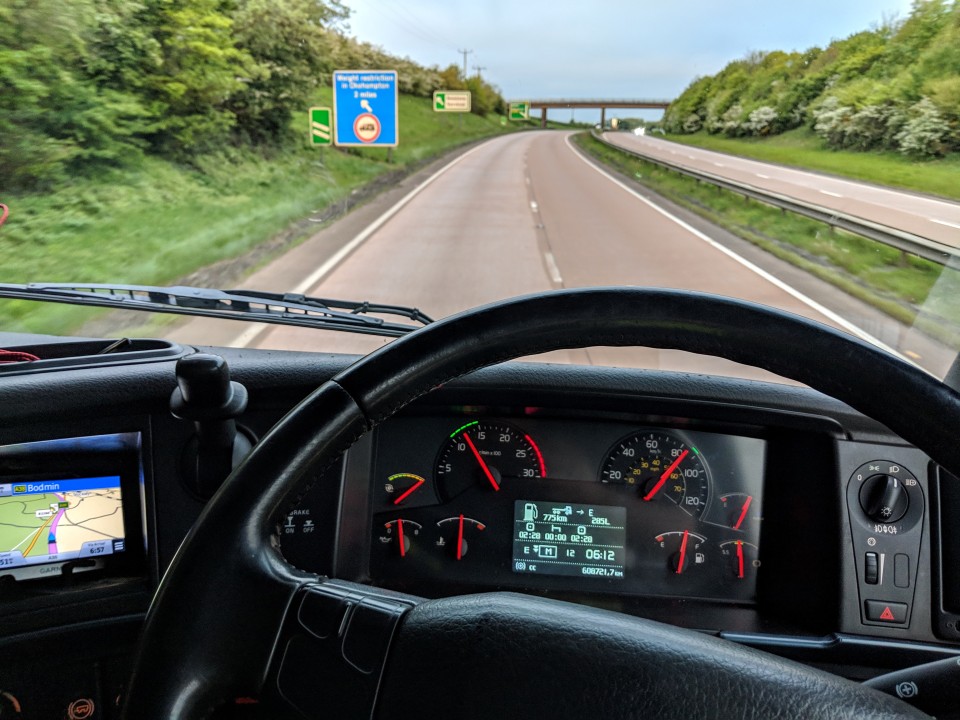
Susie Jones
Sådan bliver du en sund lastbilchauffør
Oprettet: 27.08.2024
•
Opdateret: 27.08.2024
Lastbilkørsel er et krævende erhverv, der ofte indebærer lange arbejdsdage, en stillesiddende livsstil og længere perioder væk fra hjemmet, hvilket ofte kan gå ud over mange chaufførers helbred.
Usunde vaner som indtagelse af fastfood, mangel på fysisk aktivitet og forstyrrende søvnmønstre kan alle føre til potentielle helbredskomplikationer i fremtiden. Men hvordan holder man sig i form som lastbilchauffør? Det er lettere sagt end gjort, men vi har samlet en liste med tips, der kan hjælpe dig med at holde dig i topform, mens du er på farten.
Seks gode råd til at holde sig sund på farten
1.Hydrering
Et simpelt tip og en vare, som vi ofte tager for givet, men de fleste sundhedsproblemer opstår på grund af dehydrering. Regelmæssige slurke af vand eller squash i løbet af dagen udskiller stofskifteaffald og giftstoffer fra dit system og holder dig mere energisk og opmærksom. At have en genopfyldelig vandflaske med sig minder dig ikke kun om at holde dig hydreret, men er også bedre for miljøet.
2.Kost
Fristelsen til fastfood efter en lang dag er noget, vi alle kan forholde os til, men ligesom at holde sig hydreret spiller din kost en vigtig rolle for dit helbred og for, hvordan du ender med at føle dig i løbet af dagen.
Det anbefales, at lastbilchauffører spiser tre til fire gange om dagen, enten to måltider og to mellemmåltider eller to måltider og et mellemmåltid. Prøv at opretholde en plan for måltider og mellemmåltider med et højt indhold af omega-3, jern og C-vitamin, f.eks. grønne bladgrøntsager, fisk og frugt. Undgå mad og drikke, der indtages ofte, som pasta, brød, søde drikke og stimulanser som kaffe og energidrikke.
Se vores liste over sunde snacks, som du kan have med i førerhuset:
Granolabarer
Energibarer
Popcorn
Nødder
Tørret frugt
Mørk chokolade
Ud over at købe sund mad, mens du er på farten, kan det nogle gange være sundere og mere omkostningseffektivt at tilberede måltider. [Frieghtech] (https://freightech.us/easy-meal-ideas-for-truck-drivers/) har et fantastisk udvalg af opskrifter, der kan hjælpe dig med at opretholde en sund kost, mens du er på arbejde.
3.Sleep
På grund af arbejdets karakter kan det være svært for en lastbilchauffør at få nok søvn, og det kan føre til ødelæggende resultater for alle på vejen.
Enkle tips og tricks som de følgende kan hjælpe dig med at få en god nats søvn:
Skab et miljø i førerhuset, der føles som hjemme. Se vores indlæg om, hvordan du gør dit lastbilførerhus til et hjem
Hold dit soveområde mørkt
Et varmt brusebad: Brug vores side maps til at finde ud af, hvilke rastepladser der tilbyder denne facilitet.
Prøv nogle apps, der kan hjælpe dig med at sove
Find det ideelle sted at parkere med mindst mulig støj og forstyrrelse. Vores intruck-app indeholder 5.000 HGV-pladser (Heavy Goods Vehicle) i hele Europa, som du kan vælge imellem, mens vores [SNAP Access and Security]-team (https://snapaccessandsecurity.com/) kan levere skræddersyede sikkerhedsløsninger, så du kan få en bedre nattesøvn i visheden om, at du og din lastbil er i sikkerhed.
4.Motion
Et af de sværeste råd at følge, når man er på farten, men ikke desto mindre et vigtigt råd. Hvis man sidder ned i mange timer i løbet af dagen, kan det føre til dårlig kropsholdning, rygsmerter og potentielle helbredskomplikationer. Efter en lang dag bag rattet kan det være fristende at sidde og slappe af, men en hurtig 15 minutters aktivitet som at gå eller strække ud kan få dig til at føle dig forynget og mindre stresset.
[HMD Trucking] (https://www.hmdtrucking.com/blog/truck-driver-exercises-workout/) har nogle nyttige øvelser, der er skræddersyet til lastbilchauffører, hvis du ønsker at indarbejde flere typer fysisk træning i din rutine.
5. Vitaminer
At være på farten hele tiden kan gøre det svært at få alle de nødvendige vitaminer. Hvis du tager en multivitamin hver dag, kan det styrke dit immunforsvar og hjælpe dig med at holde dig sund.
6.Mental sundhed
Vi ved, at det er vigtigt at passe på sit fysiske helbred i trafikken, men hvor meget tid bruger lastbilchauffører på at passe på deres mentale helbred?

Velgørenhedsorganisationen Mind har offentliggjort statistikker, der viser, at 30 % af de selvrapporterede arbejdsrelaterede sygdomme i transport- og logistikbranchen skyldes angst, ensomhed, stress og depression. De antydede også, at dette tal kunne være højere, da de fleste mennesker ikke søger den hjælp, de har brug for. Derudover vil 95 % af de sygemeldte ikke angive den egentlige årsag til deres fravær fra arbejdet, hvis det drejer sig om deres mentale helbred.
Hvis du følger ovenstående tips og tricks, kan det have en positiv effekt på din mentale sundhed. Desuden er det vigtigt at have åbne og ærlige samtaler med andre lastbilchauffører, supervisorer eller disponenter.
Kan motion gøre dig til en bedre bilist?
En sund livsstil fører ikke kun til bedre mental sundhed, men noget tyder på, at den også kan gøre dig til en bedre bilist. En undersøgelse viste, at bilister, der blev bedt om at træne dagligt, rapporterede, at de havde lettere ved at dreje hovedet, at de var i stand til at rotere kroppen mere, og at de var i stand til at sætte sig hurtigere ind i bilen.
Hvad er det hårdeste ved at være lastbilchauffør?
De lange arbejdstider ser ud til at være et af de hårdeste aspekter ved at køre lastbil. Lastbilchauffører skal ofte tilbagelægge mange kilometer og har asociale arbejdstider. De mange kilometer og de asociale arbejdstider kan føre til en usund livsstil.

Hvor usundt er det at være lastbilchauffør?
På grund af mange lastbilchaufførers livsstil er de i gennemsnit statistisk set mere tilbøjelige til at have helbredsproblemer sammenlignet med folk i andre karrierer. Lastbilchauffører står ofte over for en række forhindringer som f.eks. trange arbejdsforhold, stressede situationer, usædvanlige sovemønstre og mangel på næringsrig mad, som alle har indflydelse på deres helbred.
At opretholde en sund livsstil som lastbilchauffør kræver en bevidst indsats, men fordelene ved at gøre det er det hele værd. Ovenstående tips vil gøre det muligt for dig at tage kontrol over dit helbred og forbedre dit velbefindende. Hold øje med flere tips og tricks fra os i SNAP.



